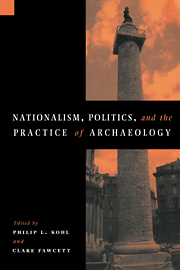Book contents
- Frontmatter
- Contents
- List of maps
- List of contributors
- Acknowledgments
- Part I Introduction
- Part II Western Europe
- 2 Civilization, barbarism, and nationalism in European archaeology
- 3 Archaeology and nationalism in Spain
- 4 Nationalism and Copper Age research in Portugal during the Salazar regime (1932–1974)
- 5 Archaeology in Nazi Germany: the legacy of the Faustian bargain
- 6 Nazi and eco-feminist prehistories: ideology and empiricism in Indo-European archaeology
- Part III Eastern Europe and Eurasia
- Part IV East Asia
- Part V Commentary
- Bibliography
- Index
4 - Nationalism and Copper Age research in Portugal during the Salazar regime (1932–1974)
Published online by Cambridge University Press: 06 October 2009
- Frontmatter
- Contents
- List of maps
- List of contributors
- Acknowledgments
- Part I Introduction
- Part II Western Europe
- 2 Civilization, barbarism, and nationalism in European archaeology
- 3 Archaeology and nationalism in Spain
- 4 Nationalism and Copper Age research in Portugal during the Salazar regime (1932–1974)
- 5 Archaeology in Nazi Germany: the legacy of the Faustian bargain
- 6 Nazi and eco-feminist prehistories: ideology and empiricism in Indo-European archaeology
- Part III Eastern Europe and Eurasia
- Part IV East Asia
- Part V Commentary
- Bibliography
- Index
Summary
Shame on the child that is not proud of his parents. Shame on
whomever is not proud of his fatherland. Yes, I am proud. I am
proud of being a Portuguese, and the primary cause of my pride is
the history of my country … Admirable history of a heroic race that
has no match in the world. My chest expands, my heart beats with
pride. Yes, blessed mother that raised me, blessed this passionate race,
supreme and magnificent, of our beloved Portugal.
(Sampaio 1926:13, 33)We were a great people, therefore we are a great people.
(Aragão 1985:291)That archaeology can be informed by nationalist ideologies is assumed. Specifying precisely how nationalism articulates with interpretations of the past, however, presents a formidable challenge to the historiographer. Archaeologists rarely make explicit, either in published form or in correspondence, their political, social, or psychological agendas. The historiographer is forced, therefore, to make associations from often meager documentation. Furthermore, many archaeological historiographers are archaeologists who have been trained to deal with long-extinct societies. When considering the individual, who may still be alive, they must employ a new scale of analysis and exercise a higher degree of political awareness and sensitivity. But, to pursue the issue of nationalism in archaeology, to understand the link between the mind of a political leader and the archaeological record, the historiographer must assume these responsibilities.
- Type
- Chapter
- Information
- Nationalism, Politics and the Practice of Archaeology , pp. 57 - 69Publisher: Cambridge University PressPrint publication year: 1996
- 1
- Cited by

